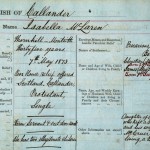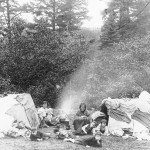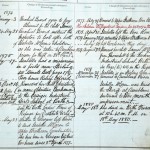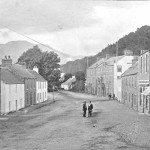This register and others like it held at the Archives give some of the most detailed information that you can find about people living in the past. The Poor Law (Scotland) Act of 1845 created a system of committees, known as Parochial Boards, across Scotland, the members of which were responsible for helping those in need. The Board areas were based on the parish boundary areas and the new system was designed to replace the assistance previously offered by the Kirk based on donations to and fines imposed by the Kirk Session Courts.
The reason why the records are so rich originates with the anxiety of mid Victorian society that public money should be spent wisely. Just as we see today, popular opinion was very much against the notion of those who were able to work receiving benefits. Consequently, the Parochial Boards had to gather information about the individuals who came to them for help in order to prove that they had no other means of support. Details were taken of the geographical origins of applicants, the names of their parents, siblings and children, their state of health, religion and recent activities. Many registers, after recording the details of the initial application, then go on to give a note at their page in the register of every time the individual contacted the authority for help. This can provide a biography of the person and their activities over a long period of time in their lives. The resulting registers give a really intimate insight into the lives and circumstances of a section of the population that does not otherwise leave much of a trace of themselves in the written record. They are particularly useful when looking for details of the marginalised in other sources, for example, travelling people and children.
The way in which the records are kept can vary from parish to parish depending on how the Inspector of the Poor approached the issue. The example chosen here from Callander Parish was kept meticulously in very readable handwriting by Quintin Brown, Inspector of the Poor for Callander from the beginning of the Parochial Board system to around 1890. Brown took pains to record everything that he felt was important and the volumes produced by him give wonderful detail of the cases that were subject to his care.
The entry for Isabella McLaren in the register gives a wealth of detail about her life. Background information concerning her, taken when she first applied to the Board, is given at the top of the page. Here we find where she is living, her age, religion, what occupations she has had, her state of health and the names of both her parents and two small children. The bottom half of the page gives details of her life between her first application in May 1873 and her untimely death in May 1880, at the age of 42, in Perth Prison. More information about Isabella and her two children can be found in the minute books of the Board that are also held at the Archives. These give a really clear picture of the precarious nature of the life of a single mother who lacks support and a steady job in Victorian Scotland and provide a genuine sense of connection with the past. Like that of so many of the people who feature in these records, Isabella’s story is a very sad one.



